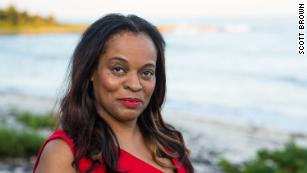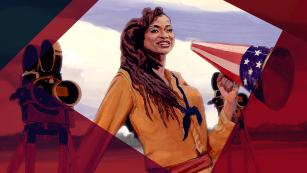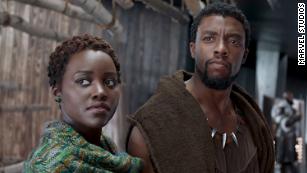begin quote from:
https://www.cnn.com/2018/03/09/opinions/wrinkle-in-time-duvernay-black-panther-representation-bolton-opinion/index.html
Watching 'A Wrinkle in Time' is a political act
By Kerra Bolton
Updated 8:26 AM ET, Fri March 9, 2018
Kerra L. Bolton is the founder of Unmuted Consulting, a strategic political communications consultancy and online academy. She is also a freelance writer and former political reporter and analyst in North Carolina. The views expressed in this commentary are her own.
(CNN)Purchasing a movie ticket has become the latest act of political resistance.
The Black Lives Matter and #MeToo movements, started and inspired by courageous black women, have ushered in cultural sea changes -- including challenging harmful and inaccurate media portrayals of African-Americans. The movie "Black Panther" has provided a rare opportunity to celebrate and savor the success of a story in which black characters' individual choices shape their collective destiny.

Kerra Bolton
"A Wrinkle in Time," directed by Ava DuVernay, opens this weekend. The film is an adaptation of the 1962 book of the same name written by Madeleine L'Engle. A blend of science fiction, fantasy, and young adult coming-of-age narrative, it is the story of Meg Murry, an awkward and brilliant teenage girl, who adventures across space and time to rescue her scientist father, mysteriously gone missing. DuVernay's role as director brings a subtle strain of intersectionality woefully missing from much popular young adult fiction like "The Hunger Games" and the "Twilight" trilogy, in which white girls save the world.
The diverse casting in "A Wrinkle in Time" also takes an important step in normalizing girls and women of color as heroines of our own stories, interested in math and science, and struggling to define ourselves in a world that doesn't always accept us for who we are. The movie presents a vision of female empowerment in which whiteness is no longer the standard.
Unlike "Black Panther," race is not central to the characterization or plot of "A Wrinkle in Time." L'Engle, who authored multiple young adult novels, was white. While her books touch on issues of equality in some ways, race is rarely an explicit theme.
Race is present in this film adaptation because of DuVernay's decision to cast biracial actor Storm Reid as the movie's protagonist. Oprah Winfrey and Mindy Kaling are also cast as two of the fantasy creatures who help Meg and her brother seek their father's freedom.
Representation matters, as Rashad Robinson, executive director of Color of Change (a civil rights advocacy organization formed in 2005 in the aftermath of Hurricane Katrina) told me -- especially for children. By going to see films like "Black Panther" and "A Wrinkle in Time," "kids of color get to see themselves as heroes, centered in the story, and as the person to root for," Robinson said.
It remains to be seen whether "A Wrinkle in Time" will experience anything like the same box-office success and emotional resonance with African-American audiences that "Black Panther" has had. Some prognosticators think it's unlikely, but it's possible. As teenagers, we often consume media to affirm we are not alone in our freakishness. We long to embark on heroic quests in which the very qualities society deems "wrong" about us -- a love of math and science for example -- become tools for positive transformation and change.
This is what the book "A Wrinkle in Time" did for generations of white girls, and some black girls, who loved the book and now want to share the same sense of awe and recognition they felt when reading the book with their children and grandchildren.
Black girls of a certain age who liked speculative fiction had limited choices when searching for inspiration. Some enjoyed L'Engle, and looked to other authors like Octavia Butler or Tananarive Due for inspiration because their novels featured characters who looked and sounded like them. For some black women, the "Wrinkle in Time" movie's appeal may be less about nostalgia and more about its director. DuVernay's bold directorial vision inspires us all.
"I absolutely love Ava DuVernay," said my friend Kimberly Simon as we discussed the importance of the success of giving black children positive role models on- and off-screen. Simon and her husband raised more than $300 to take 32 local foster children to see "Black Panther," and will do the same for "A Wrinkle in Time."
"She is the first African-American woman given the budget (of more than $100 million) to do this," Simon said. "Little girls can see her and say, 'I want to be a director.'"
Regardless of the reasons why we choose to see "A Wrinkle in Time," it is important that we eradicate negative stereotypes of blacks in media. The media images we consume bleed into the public consciousness and seep into our education, housing, health care, and criminal justice systems. We may not be able to march every day. But we can vote at the polling place and with our dollars at the movie theater. The revolution will not only be televised, but it will come with a pair of 3-D glasses.















No comments:
Post a Comment